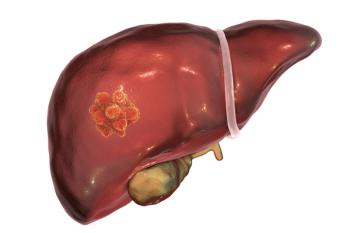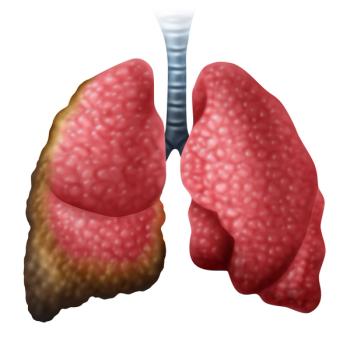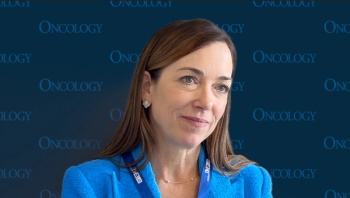
Findings from the PSMAddition trial support the benefit of the early addition of lutetium Lu 177 vipivotide tetraxetan in metastatic HSPC.

Your AI-Trained Oncology Knowledge Connection!


Findings from the PSMAddition trial support the benefit of the early addition of lutetium Lu 177 vipivotide tetraxetan in metastatic HSPC.

Data from the BL-B01D1-301 study support iza-bren as a potential standard of care for pretreated recurrent or metastatic nasopharyngeal carcinoma.

Findings from the DeFianCe trial support further development of sirexatamab in DKK1-high previously treated metastatic colorectal cancer.

Data from the phase 3 HARMONi-6 study may support ivonescimab plus chemotherapy as a new standard of care in advanced squamous non–small cell lung cancer.

The investigator-evaluated ORR was 39.0% among those treated for recurrent/metastatic HNSCC, and the CR and PR rates were 9.8% and 29.3%, respectively.

Patients with ESCC treated in 2 tislelizumab-based arms experienced higher composite complete response rates compared to chemoradiotherapy alone.

Overall survival data in the IMbrave152/SKYSCRAPER-14 study are not anticipated to show statistical significance.

In terms of OS among patients with non-tBRCA–mutated, HRD-positive disease, the median value was not reached in either durvalumab arm.

Slow accrual led to the early stopping of the phase 3 DREAM3R trial assessing durvalumab/chemotherapy in advanced pleural mesothelioma.

Findings from the ENZARAD trial support adding enzalutamide to androgen deprivation therapy for those with positive lymph nodes.

OptiTROP-Lung04 data show sacituzumab tirumotecan cut the risk of progression or death by 51% in patients with nonsquamous EGFR-mutated NSCLC resistant to EGFR TKIs.

Gedatolisib-based triplet regimens may be effective among patients with prior endocrine resistance or rapid progression following frontline therapy.

Disitamab vedotin plus toripalimab achieved a median 13.1-month PFS and median 31.5-month OS in patients with HER2-expressing advanced urothelial carcinoma.

At 8 years follow-up, patients with recurrent prostate cancer in the enzalutamide/leuprolide arm had an OS rate of 78.9% vs 69.5% vs leuprolide alone.

Data from the ROSELLA trial show a consistent benefit with relacorilant plus nab-paclitaxel across PROC subgroups.

A significant survival improvement was observed among patients with dMMR carcinomas who received atezolizumab/chemotherapy.

Data from the INTERCEPT study support ctDNA clearance as a useful end point for potential benefit in studies assessing novel therapeutics.

Data from OptiTROP-Breast02 support sac-TMT as a new treatment option for those with hormone receptor–positive, HER2-negative breast cancer.

Capivasertib plus abiraterone shows consistent benefits across clinical end points in the phase 3 CAPItello-281 trial.

Data from IDeate-Lung01 reveal a disease control rate exceeding 90% with infinatamab deruxtecan.

Although the ORR was similar among patients treated with sacituzumab govitecan vs chemotherapy for TNBC, the DOR was higher with sacituzumab govitecan.

An analysis of baseline PROs in patients with solid tumors found younger female patients experiencing the lowest emotional function scores compared with older male patients.

Gedatolisib enhanced PFS in advanced breast cancer, showcasing significant benefits when combined with fulvestrant and palbociclib.

Enfortumab vedotin plus pembrolizumab enhanced survival rates for patients with muscle-invasive bladder cancer not eligible for cisplatin chemotherapy.

T-DXd followed by THP is more effective and less toxic than dose-dense doxorubicin and cyclophosphamide then THP in this breast cancer population.

The SKYSCRAPER-03 trial revealed that tiragolumab plus atezolizumab failed to improve progression-free survival compared with durvalumab in NSCLC.

Cemiplimab showed comparable rates of second primary tumors and improved disease-free survival in high-risk cutaneous squamous cell carcinoma patients.

T-DXd significantly improved iDFS compared with T-DM1 across various patient subgroups in high-risk, HER2-positive primary breast cancer with residual invasive disease.

Nine-year final results from the CheckMate 238 trial demonstrated that adjuvant nivolumab significantly improved time to second disease progression.

Results from the phase 3 KEYNOTE-B96 trial showed favorable results with pembrolizumab-based therapy in this ovarian cancer population.